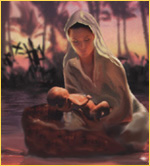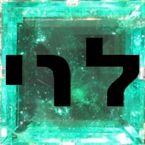Jochebed
 From Conservapedia
From Conservapedia Jochebed (Hebrew יֹוכֶ֤בֶד, Yohéved, Glory of God) (ca. 2385 AM–2518 AM) (ca. 1620 BC–1487 BC) was the daughter of Levi, wife of Amram, and mother of Miriam, Aaron, and Moses.
Life and family[edit]
The Masoretic Text states that Jochebed was Amram's father's sister. Jochebed's younger son Moses was born in 2433 AM (1571 BC), about forty-eight years after the death of Jochebed's father Levi (1620 BC). The latest date that Jochebed could have been born was 2385 AM (1620 BC), the year her father died. That Jochebed could still be bearing children at the age of forty-eight might seem unlikely by modern standards. Yet the Bible reveals that Levi and his son and grandson all had very long life spans.
Though she could have lived through the Exodus of Israel and eventually crossed the Red Sea into the wilderness, the Bible never actually says that she did this.
A desperate measure[edit]
In 2433 AM, Jochebed gave birth to Moses. This was the year that the reigning Pharaoh decreed that every male Hebrew child be thrown into the Nile River. For three months Jochebed hid Moses in her home, but she could not hide him indefinitely. So she took a wicker basket and covered it with tar and pitch. Then she placed Moses into it and set it adrift in the Nile.
Jochebed's daughter Miriam followed the basket as it drifted into the private beach area that belonged to the royal family. The Pharaoh's daughter was bathing in the Nile, when one of her maids saw the basket and brought it to her. Instead of drowning the child, she kept it for herself and gave it the name of Moses, which means "drawn out."
Adding to the irony, Miriam stepped forward and offered to find a nurse for the baby. The Pharaoh's daughter gave her consent, and Miriam introduced Jochebed to the princess. The princess then hired Jochebed to nurse her own son. (Exodus 2:1-10 )
Miriam was thus old enough to walk and even to speak. Though the Bible gives no specific date for Miriam's birth, Ussher suggests that it took place in 2422 AM, eleven years before the birth of Moses.[1]
Death[edit]
The Bible gives no specific date for the death of Jochebed. Because she was the sister of Kohath, who lived for 133 years, she could have lived the same number of years and died five years after the Exodus of Israel.
In fiction[edit]
Jochebed appears in at least two motion picture projects depicting the life of Moses and the oppression and Exodus of Israel. In the famous Cecil B. DeMille movie The Ten Commandments (where she is credited as Yochebel), she is shown setting Moses adrift in his wicker ark, and then as an aging slave who is almost buried alive by entrapment within two heavy monument stones until Moses, while still a prince of Egypt and even a contender for the throne, sets her free (and also pardons Joshua, who had struck an Egyptian overseer to force the Egyptians to stop moving the stone). Later, when Moses has begun to inquire into his true origins, she reproaches Moses for his Egyptian ideology and his belonging to a religion that worships idols. Still later, Ramses II sends Moses into exile, but first gives him a Levite cloak (red with alternating black and white stripes) that, he says, Jochebed sent to him before she died.
Jochebed's encounter with Moses and Joshua together could not have occurred in real life, however. Floyd Nolen Jones calculates that if Joshua died twenty years after the ending of the seven years of warfare in the Promised Land, as Flavius Josephus states, then he must have been born no earlier than 1534 BC, or no more than three years before Moses' exile.[2] Yet the Cecil B. DeMille movie depicts Joshua as a grown man, and in fact shows him aging but few years during the time that Moses is supposed to be in exile in Midianite country.[3]
In the Jeffrey Katzenberg animated-cartoon project The Prince of Egypt, Jochebed appears briefly setting Moses adrift, and presumably has long died before Moses meets a defiant Miriam who repeats Jochebed's last lullaby to him, thus triggering in him the memory of his true origin. Though this project also is flawed, its portrait of Jochebed is consistent with the Biblical narrative.
References[edit]
- ↑ James Ussher, The Annals of the World, Green Forest, AR: Master Books, 2003, pghh. 166, 266
- ↑ Jones, Floyd N. The Chronology of the Old Testament. Green Forest, AR: Master Books, 2004, pp. 90-91
- ↑ Added to this, Moses was never sentenced to exile. Rather, the then-reigning Pharaoh signed his death warrant and Moses had to flee like the wanted man that he was.
See also[edit]
| ||||||||||||||||||||||
Categories: [Old Testament] [Biblical Women] [Jewish People]
↧ Download as ZWI file | Last modified: 02/25/2023 03:35:25 | 14 views
☰ Source: https://www.conservapedia.com/Jochebed | License: CC BY-SA 3.0
 ZWI signed:
ZWI signed:

 KSF
KSF